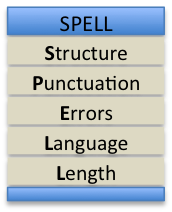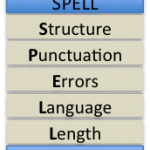Category Archives: Wordiness
SPELL—Making Sense of Sentences
 Check out this blog post about writing great sentences:
Check out this blog post about writing great sentences:
http://www.writingandspeakingforbusiness.com/blog/spell-making-sense-of-sentences
Assertive Language
In the business world, one wants to appear assertive and confident. Using “hedging” or conditional words undermines the reader’s confidence in the writer.
The most common words that undermine a writer are: seems, appears, maybe. To make your writing more assertive, delete these conditional words. Some examples appear below.
- Not assertive: It appears that the engineering department receives much of the blame.
- Assertive: The engineering department receives much of the blame.
- Not assertive: It seemed like everyone thought there was a different problem.
- Assertive: Everyone thought there was a different problem.
- Not assertive: The XYZ Corporation appears to be very successful.
- Assertive: The XYZ Corporation is very successful.
- Not assertive: The R&D team is pretty much off the hook.
- Assertive: The R&D team is off the hook. (This is terrible vocabulary, however.)
- Not assertive: The first recommendation I would make is to spell check your document.
- Assertive: First, I recommend you spell check your document.
- Not assertive: I think that maybe what the company should do is hire a consultant.
- Assertive: The company should hire a consultant.
Now that you have seen some examples, look for conditional words in your writing and eliminate as many as possible.
The Lonely This
Writers often use “This” to refer to the subject of the previous sentence. However, using the pronoun “this” alone is sometimes called a Lonely This. A subject should follow a “This.”
A Lonely This looks like:
- This is mine.
- This is likely due to too much freedom.
- This left them feeling inadequate.
In each of these examples, the reader does not know to what the “This” refers. The “This” is lonely because it doesn’t have a subject.
Writers should identify the “This” as in the following examples:
- This textbook is mine.
- This problem is likely due to too much freedom.
- This problem left them feeling inadequate.
In these examples, the “This” is followed by a noun. The more specificity in your writing, the easier it is to read because the reader doesn’t have to re-read sections to determine your subject.
Active and Passive Verbs
Active and Passive voice causes writers many, many problems. In business writing, you want to use active voice because sentences in active voice are more direct and forceful. Active voice sentences clearly identify who is doing the action. This reduces confusion and increases brevity in business documents.
In passive voice, who or what does the action of the sentence is implied, unknown, or comes after the verb in the sentence. Passive voice is often used when a writer wants to deflect blame or criticism, or when the action of the sentence is more important than the doer/actor.
The easiest way to determine if a verb is active or passive is to ask the following two questions:
What is the verb?
Who/what is doing the action (verb)?
If you know who is acting = active voice
If you’re unsure who is acting = passive voice
Are the following sentences active or passive?
1. Companies expect accounting positions to increase in the next ten years.
- What is the verb? Expect
- Who/what is expecting? Companies
- This sentence is active.
2. They have to work with computers.
- What is the verb? Work
- Who is working? “They”
- This sentence is active.
3. The report was left on the desk.
- What is the verb? Left
- Who/what left the report? We don’t know.
- This sentence is passive.
4. Several students were failed because of poor writing.
- What is the verb? Failed
- Who failed the students? We don’t know.
- This sentence is passive.
Once you’ve identified passive verbs, how do you change them to active verbs?
- Identify the verb
- Identify who is doing the action of the verb.
- Name the actor as the subject.
Consider the following examples of passive verbs changed into active verbs.
- I was identified by the MBTI as an IFNJ.
- Verb is “identified”
- Who identified? The MBTI
- Revised: The MBTI identified me as an IFNJ.
- A new program was devised for making automatic payments.
- Verb is “devised”
- Who devised? We don’t know, so we must add or name the subject
- Revised: Technicians devised a new program for making automatic payments. Or: The new program is for making automatic payments.
Now, find the passive verbs in your writing by asking:
- What is the verb?
- Who is doing the action of the verb?
Change the sentence to active voice by naming the actor (who/what does the action of the verb) first in the sentence (before the verb).
Conciseness
Being concise means using as few words as possible to effectively and clearly relay your message.
Throughout most of your education, you have been required to fill a designated number of pages and learned to use a lot of words to fill space.
In business, time is money and hiding your message within long, wordy sentences will cost your company time.
Read this article to learn more about writing concisely.
https://owl.english.purdue.edu/owl/resource/572/1/
Expletives or It Is S***tty Writing
In grammar studies, Expletives (E) aren’t those words your mom and teachers told you not to say. They are sentences starting with “It is” or “There are.”
These constructions are generally wordy and bury the sentence’s main point. In business writing, avoid these constructions whenever possible.
Correct: Job opportunities should rise fifteen percent in Minnesota
Incorrect: There is expected to be a fifteen percent growth in Minnesota.
Correct: Managers must make strong decisions.
Incorrect: As a manager, it is important to make strong decisions.
Correct: Accounting requires many detailed courses.
Incorrect: There are so many detailed courses in accounting.
Removing expletives makes your main point clearer, not hidden under so many words, and the sentences are less wordy.








